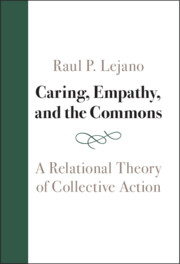Book contents
- Caring, Empathy, and the Commons
- Caring, Empathy, and the Commons
- Copyright page
- Contents
- Figures
- Tables
- Preface and Acknowledgments
- 1 Introduction
- 2 Constructing a Relational Theory of Collective Action
- 3 Further Justifications of the Relational Theory
- 4 Connectedness and Pro-Social/Pro-Environmental Behavior
- 5 Illustrations
- 6 Institutional Considerations
- 7 Prospects of Relationality
- References
- Index
5 - Illustrations
Governing the Commons
Published online by Cambridge University Press: 17 August 2023
- Caring, Empathy, and the Commons
- Caring, Empathy, and the Commons
- Copyright page
- Contents
- Figures
- Tables
- Preface and Acknowledgments
- 1 Introduction
- 2 Constructing a Relational Theory of Collective Action
- 3 Further Justifications of the Relational Theory
- 4 Connectedness and Pro-Social/Pro-Environmental Behavior
- 5 Illustrations
- 6 Institutional Considerations
- 7 Prospects of Relationality
- References
- Index
Summary
Treading the same ground as Ostroms original work, we examine the relevance of caring, empathy, and relationality for governance of the commons. There are numerous instances of commons where group boundaries, rules for resource use, and sanctions are possible, and more diffused modes of coordination and management are needed. It is in these situations that relationality holds the most promise. We examine early evidence, from experiments in the field to smaller real-world situations, where connectedness and empathy serve to bind individuals to collective action. Moreover, we realize that relational and rational mechanisms are not mutually exclusive and suggest that, even in situations where Ostroms design principle take effect, relationality works behind the scenes to strengthen collective action.
- Type
- Chapter
- Information
- Caring, Empathy, and the CommonsA Relational Theory of Collective Action, pp. 72 - 92Publisher: Cambridge University PressPrint publication year: 2023

